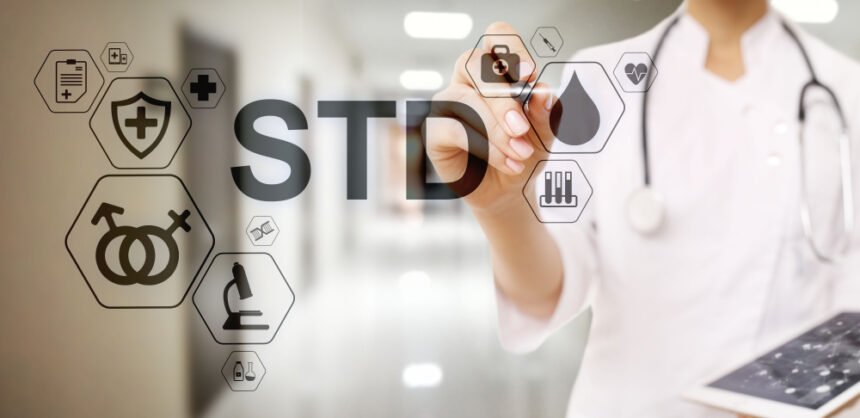Sexually transmitted diseases are a serious concern for most Americans. Unfortunately, a lot of misconceptions about them have created a stigma and unnecessary paranoia. The problem is that people tend to think of all STDs as being equal. They are worried about finding out that they have been diagnosed with an STD, because they think that it is the same thing as being diagnosed with HIV or herpes. The truth is that most STDs are not life-threatening or permanent. The majority are actually able to be cured with a course of antibiotics. Unfortunately, many people don’t understand this and refuse to get tested. They would rather suffer in silence and dismiss any symptoms as something more benign. The truth is that while most STDs are not permanent, they will certainly get worse if not treated. It is important to get tested. You might be more willing to do so if you are more aware of them and avoid some of the misconceptions listed below.
Avoiding the Myths of STDs and the Importance of Getting Tested
Your sexual health is more important than you think. For many of us, the only time that we are exposed to the importance of sexual health, and learn about the human anatomy when it comes to sex, STDs, and childbirth, is in a high school health class. And during this sensitive time of hyper hormones, acne, and fits of extreme embarrassment, we probably were just waiting for the lectures to end anyway. That’s why, when it comes to our sexual health as adults, some of us don’t know as much as we should about getting tested and avoiding STDs, a few of which are incurable. But don’t freak out just yet, contracting an STD is somewhat normal when we look at the statistics. One in two Americans will contract an STD at some point in their lifetimes. One in two sexually active adults will contract an STD by 25. In fact, one million cases are transmitted every single day. Don’t worry about the stigma around getting tested, because there shouldn’t be one! Getting tested regularly shows that you have respect for your partners’ bodies and your own. If you’re not sure where to start in getting tested, there are a few questions you need to ask yourself before you do, so you can get the proper help you need.
- Have you had unprotected sex?
Sometimes, the heat of the moment can cause you and your partner to get caught up. If you didn’t use protection like condoms, then you and your partner are at risk of contracting or passing on an STD, and you might also be at risk of an unintended pregnancy if you had unprotected heterosexual sex. Even if you’re in a monogamous relationship, the monogamy agreement could have been compromised. If you have a feeling that your partner has not been faithful, or if you start experiencing symptoms of an STD, it doesn’t hurt to get tested just in case. Some symptoms don’t show up for weeks or even months, and some don’t appear at all. If you’ve had unprotected sex with a new partner, then you are most likely unaware of their sexual history and STD history. You could have easily been infected with an STD. If this is the case, then you should get tested right away to prevent from passing a potential STD to another partner unknowingly.
1. Have you been having sexual contact with multiple partners?
Those who are engaging in sexual activity with multiple partners are at greater risk for contracting STDs. This is because there are more risk factors involved. If you have unprotected sex with one or more of these partners, then your risk of contracting an STD becomes even higher. If you’ve been engaging with multiple partners without using protection, then it’s time to get tested. It’s probably time to start buying condoms.
2. Have you had an STD before?
Chances are, if you’re a young person especially, or are someone who’s been sexually engaging regularly with multiple partners, then you’ve probably had an STD before, even if you don’t know it. If you have had an STD before, then you likely know what to be looking for. Those who’ve contracted STDs before are at a greater risk of contracting one again. Make sure that you’re taking your sexual health seriously. And those of your partners.
3. Were you forced to engage in sexual activity?
If you don’t remember having engaged in sexual activity with a partner or multiple partners, though there is evidence that it occurred, you should get tested. Though sexual assault can be a daunting topic and experience to have had, it’s better that you’re tested right away and decide on any emergency contraception you may need. You can also explore your legal options if you see fit to do so. There is support for victims of sexual assault and rape out there that victims can use to their advantage, even if they just need to talk to someone.
4. Do you have any symptoms?
Speaking of symptoms, do you have any? If you found yourself having unprotected sexual relations with a partner, and now you are feeling an uncomfortable burning or itching coming from the penis or the vagina, or you are excreting a strange discharge or odor from those areas, then you may have contracted something. You could also be experiencing pain in the throat (which could be associated with contracting gonorrhea), pain in the testicles, painful bowel movements, pain during sex, bleeding between periods, sores that could be warts, or flu-like symptoms. If you are experiencing any of these above mentioned, get yourself to a testing clinic. While these are the most common signs of an STD infection, it still doesn’t always mean that you have an STD. Everyone’s body behaves differently, but it’s better to be sure about your status than unsure. Even some of the most prevalent STDs are asymptomatic, meaning that many people who’ve tested positive for chlamydia or gonorrhea had no symptoms at all before getting tested. Whether you have symptoms or not, you should always get tested after you think you’ve been exposed.
5. Do you know where to go?
Once you’ve decided that you need to get tested for any potential STDs, you need to find a place that will test you. Women should be able to be tested by their gynecologist if you’d rather discuss the subject with a doctor you trust. Regardless of gender, many clinics offer free services for those who’d like to get tested. A quick internet search should help you find the closest testing center near you. If you’re shy about getting tested, or you don’t have a testing clinic in your vicinity, there is also the option of an at home test like https://www.selfcollect.com/store/products/chlamydia-gonorrhea. Preventative Actions to Take Next Time Before running into this problem again, there are multiple ways in which you can protect yourself from being exposed to STDs.
- Abstain from sex.
- Communicate with your partner about sexual history and monogamy.
- Use condoms every time.
Make Getting Tested a Priority
There are a lot of priorities that you need to have when it comes to your reproductive health. One of the biggest is making sure that you get tested for STDs.










